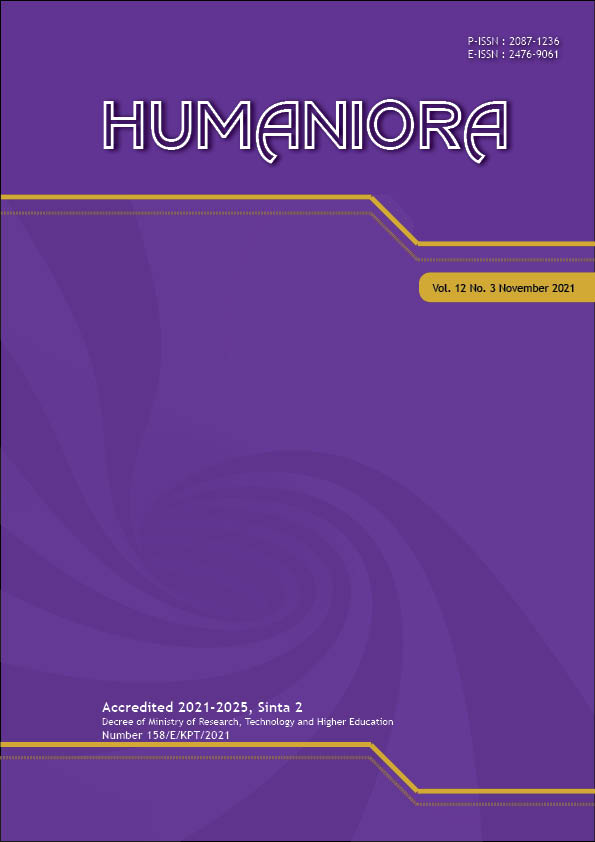Development of a Learning Module Using Constructive Alignment Theory in Project Managerial Course
DOI:
https://doi.org/10.21512/humaniora.v12i3.7304Keywords:
constructive alignment, learning module, project managerial courseAbstract
The research intended to develop an ideal learning module using constructive alignment theory on Project Managerial course. It seemed difficult to draw firm conclusions about constructivism due to the various interpretations both pedagogically and epistemically. The mixed-method was used to survey 56 students participating in the Project Managerial course. Moreover, qualitative methods were implemented for deeper analysis. The methods provided an overview of the students’ level of understanding of the material, what they can do at the end of the lesson, as well as learning activities that can help students be actively involved in class. It was also to find out whether students have achieved the expected outcomes. The results prove that students’ understanding of the Project Managerial course is good, with an average score of 59,80 before the test and 85,88 after the test (n = 56). Students’ feedback shows that group assignment remains lacking of students’ participation with an average value of 3,4. In every relationship between the client and the designer, there are more or less the same systematic phases so that the results can be consistent. Different designers may have different terms. The research provides a big picture of the ideal design project management pattern. Whatever term is used later, of course, every successful design project must be managed properly and consistently.
References
Ali, L. (2018). The design of curriculum, assessment and evaluation in higher education with constructive alignment. Journal of Education and E-Learning Research, 5(1), 72-78. https://doi.org/10.20448/journal.509.2018.51.72.78.
Biggs, J. (2001). The reflective institution: Assuring and enhancing the quality of teaching and learning. Higher Education, 41(3), 221-238. https://doi.org/10.1023/A:1004181331049.
Braun, V., & Clarke, V. (2019). Reflecting on reflexive thematic analysis. Qualitative Research in Sport, Exercise and Health, 11(4), 589-597. https://doi.org/10.1080/2159676X.2019.1628806.
Briggs, L. J. (1991). Instructional design: Principles and applications. Educational Technology.
Croy, S. R. (2018). Development of a group work assessment pedagogy using constructive alignment theory. Nurse Education Today, 61, 49-53. https://doi.org/10.1016/j.nedt.2017.11.006.
Dimyati, & Mudjiono. (2013). Belajar dan Pembelajaran (5th Ed.). Jakarta: Rineka Cipta.
Griffin, R. W., Gania, G., Kristiaji, W. C., & Medya, R. (2004). Management (7th Ed.). Jakarta: Erlangga.
Grima, S., Dalli-Gonzi, R., & Thalassinos, E. (2020). The impact of COVID-19 on Malta and its economy and sustainable strategies. Journal of Corporate Governance, Insurance and Risk Management, 7(1), 53-73. https://doi.org/10.51410/jcgirm.7.1.5.
Herujito, Y. M. (2010). Dasar-dasar manajemen (5th Ed.). Jakarta: Grasindo.
Ismanto, I. (2014). Evaluasi hasil belajar Pendidikan Agama Islam (PAI). Edukasia: Jurnal Penelitian Pendidikan Islam, 9(2), 211-235. https://doi.org/10.21043/edukasia.v9i2.773.
Manullang, M. (2014). Manajemen pembelajaran matematika. Jurnal Pendidikan dan Pembelajaran, 21(2), 208-214.
Maria, E., & Sediyono, E. (2017). Pengembangan model manajemen pembelajaran berbasis TIK di Sekolah Dasar. Kelola: Jurnal Manajemen Pendidikan, 4(1), 59-71. https://doi.org/10.24246/j.jk.2017.v4.i1.p59-71.
Miles, M. B., Huberman, A. M., & Saldana, J. (2013). Qualitative data analysis: A methods sourcebook. California: SAGE Publications.
Ramsden, P. (2016). Theories of learning and teaching and the practice of excellence in higher education. Higher Education Research & Development, 12(1), 87-97. https://doi.org/10.1080/0729436930120108.
Rusman. (2017). Belajar & pembelajaran berorientasi standar proses pendidikan. Jakarta: Kencana.
Syarifuddin, A. (2011). Penerapan model pembelajaran cooperative belajar dan faktor-faktor yang mempengaruhinya. Jurnal Pendidikan Islam, 16(1), 113-136. https://doi.org/https://doi.org/10.19109/td.v16i01.57.
Sidek, E. A. R., & Yunus, M. M. (2012). Students’ experiences on using blog as learning journals. Procedia - Social and Behavioral Sciences, 67, 135-143. https://doi.org/10.1016/j.sbspro.2012.11.314.
Taber, K. (2019). Constructivism in education: Concepts, methodologies, tools, and applications. In I. Management Associations (Eds.), Early Childhood Development: Concepts, Methodologies, Tools, and Applications (pp. 312-342). https://doi.org/10.4018/978-1-5225-7507-8.ch015.
Zakaria, S. F., & Awaisu, A. (2011). Shared-learning experience during a clinical pharmacy practice experience. American Journal of Pharmaceutical Education, 75(4), 1-6. https://doi.org/10.5688/ajpe75475.
Downloads
Published
How to Cite
Issue
Section
License
Copyright (c) 2021 Lisa Indriati, Christian Anggrianto

This work is licensed under a Creative Commons Attribution-ShareAlike 4.0 International License.
Authors who publish with this journal agree to the following terms:
a. Authors retain copyright and grant the journal right of first publication with the work simultaneously licensed under a Creative Commons Attribution License - Share Alike that allows others to share the work with an acknowledgment of the work's authorship and initial publication in this journal.
b. Authors are able to enter into separate, additional contractual arrangements for the non-exclusive distribution of the journal's published version of the work (e.g., post it to an institutional repository or publish it in a book), with an acknowledgment of its initial publication in this journal.
c. Authors are permitted and encouraged to post their work online (e.g., in institutional repositories or on their website) prior to and during the submission process, as it can lead to productive exchanges, as well as earlier and greater citation of published work.
USER RIGHTS
All articles published Open Access will be immediately and permanently free for everyone to read and download. We are continuously working with our author communities to select the best choice of license options, currently being defined for this journal as follows: Creative Commons Attribution-Share Alike (CC BY-SA)
























